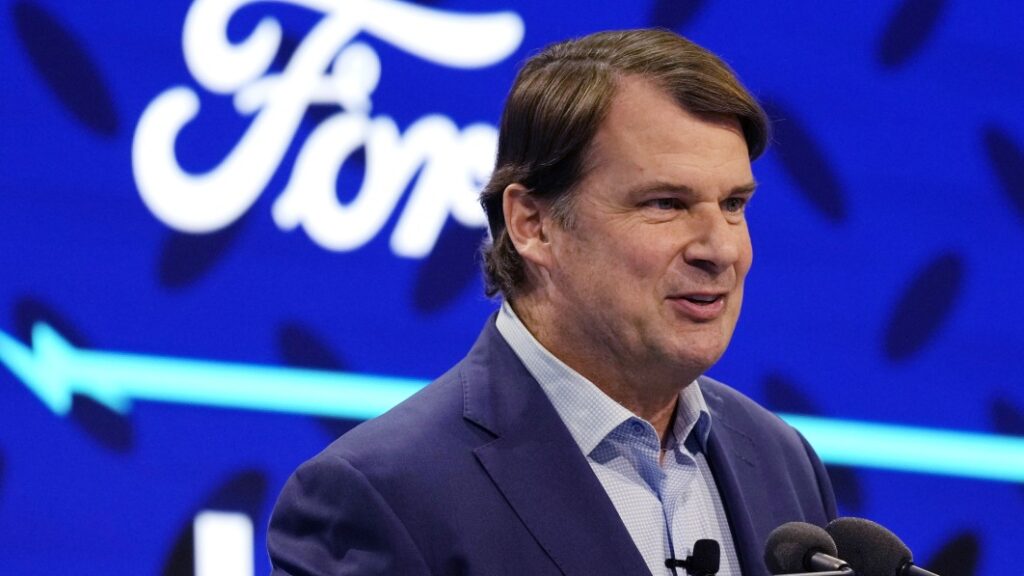Ford CEO on the future of EVs, Detroit, and his relationship with Tesla's Elon Musk

Inside a 111-year-old former Detroit train station, Ford (F) CEO Jim Farley is charting a path for the auto giant’s next 100 years.
Just don’t expect it to include electric trains.
“The building has really been revitalized physically, but what’s important is that it will have software people here, the future of our pro and our EV business will be down here,” Farley told me in a new episode of Yahoo Finance’s Opening Bid podcast (video above).
We are sitting smack in the middle of Michigan Central Station in Detroit’s Corktown neighborhood. Constructed in 1913, the station ran trains for about 75 years before officially closing in 1988 due to waning ridership — a byproduct of Detroit’s manufacturing decline.
The 472,000-square-foot building, decked out in early 1900s architecture, stood abandoned until 2018. Led by executive chairman Bill Ford, Ford purchased the building and several surrounding locations for $90 million, with a vision to reestablish Detroit as an epicenter for high-tech jobs.
Close to $1 billion of renovation work later, the rehabbed Michigan Central Station is now the center of a new mobility innovation district.
The central building will house Ford employees working on autonomous vehicle projects. Google (GOOG, GOOGL) also signed on in 2022 as a founding member of the district.
Google will share its cloud technology for the site’s various mobility projects. The company will also offer workplace development training to local high school students and job seekers.
Over time, Ford envisions the mixed-use site to include hotel and retail options to lure in vital tech talent to the rebuilding city.
Farley says the development should help the company attract the best and brightest to develop autonomous and electric vehicles.


The reopening arrives at a critical time for Ford and the race car-driving Farley, who will reach his four-year mark as CEO in October.
Ford’s stock has downshifted in the past two years as the company dealt with issues like quality control, a slowdown in the EV market, and losses in the EV business. Under Farley’s watch, Ford debuted the Mustang Mach-e SUV and Lightning F-150 pickup to compete in an EV market led by Tesla (TSLA).
He also struck up a partnership with Tesla to allow Ford EVs to charge at its Superchargers using adapters. That partnership has created a relationship with Tesla CEO Elon Musk, who Farley says he just texted the other day to ask for more charging adapters.
“I think there is a mutual respect,” Farley said of his relationship with Musk.
Ford’s shares are down 14% in the past two years, according to Yahoo Finance data, lagging the 28% gain for the S&P 500. Its rival GM’s stock (GM) has gained 12% in that span, supported by stock buybacks and aggressive cost cuts.
Farley has pivoted as market conditions evolved.
The company said in April it would push back the release of its three-row electric vehicles from 2025 to 2027. It’s also delaying EV production at the massive BlueOval City EV campus in Tennessee from 2025 to 2026.
In October 2023, Ford postponed $12 billion in planned EV spending, including the construction of a new battery factory in Kentucky. But the company committed to making more hybrids to bridge the gap during the EV transition.
A more cost-minded Ford is beginning to show up on the company’s balance sheet.
In April, Ford guided to the high-end of $10 billion to $12 billion for full-year operating profits. Adjusted free cash flow guidance was lifted to $6.5 billion to $7.5 billion — previously, the range stood at $6 billion to $7 billion.
“If Ford can continue executing in the coming quarters, the stock should benefit from positive EPS revisions and an increasingly compelling case for multiple expansion post last year’s re-segmentation — all anchored by a strong B/S & improved FCF conversion,” Citi analyst Itay Michaeli wrote in a recent client note.
Even still, the EV division will likely be the one driving the stock’s narrative — though the narrative hasn’t been a bullish one.
The Model e division (Ford’s electric segment) lost $1.32 billion in the first quarter on $100 million in sales (down 84% compared to last year). The number of vehicles sold for the division fell 20% year over year as consumers navigated away from EVs despite price cuts.
The Model e division is on track for $5 billion in operating losses this year.
Farley said he has a date in mind for EV profitability but declined to share it.
“We wouldn’t allocate capital if I didn’t think it was profitable,” he said.
Watch what Ford’s longtime competitor, General Motors, is up to in a recent episode of Yahoo Finance’s Lead This Way. CEO Mary Barra said she isn’t backing down on EVs.
Brian Sozzi is Yahoo Finance’s Executive Editor. He is also the host of the “Opening Bid” podcast. Follow Sozzi on Twitter/X @BrianSozzi and on LinkedIn. Tips on deals, mergers, activist situations, or anything else? Email brian.sozzi@yahoofinance.com. Are you a CEO and want to come on Yahoo Finance Live? Email Brian Sozzi.
Click here for the latest stock market news and in-depth analysis, including events that move stocks
Read the latest financial and business news from Yahoo Finance







